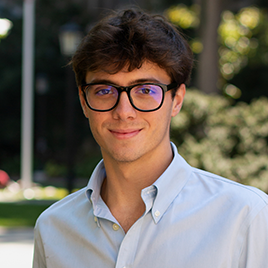
Aidan Wilber-Gauthier, a second year graduate student, is one of 30 students awarded a Computational Science Graduate Fellowship by the U.S. Department of Energy (DOE CSGF). This fellowship is awarded to students on the path to achieving doctorates in fields that emphasize the use of computing and mathematics.
Wilber-Gauthier commented, “I’m greatly honored to have been awarded the DOE CSGF. The fellowship provides up to four years of support, covering tuition and fees along with a stipend. Aside from funding, there are some additional elements of the fellowship, including a program of study and a practicum experience at a national lab.”
He continued, “My research interests are in quantum information theory and quantum error correction. The most interesting applications of quantum computers require significantly larger, more reliable devices than we have today, but scaling these devices is difficult due to the fragile nature of quantum information, which is susceptible to noise and decoherence. The aim of quantum error correction is to suppress noise to a level that allows for scalable, fault-tolerant quantum computation.”
The program, established in 1991 and funded by the DOE’s Office of Science and the National Nuclear Security Administration (NNSA), trains top leaders in computational science. As of Sept. 1, the DOE CSGF community will include more than 700 fellows and alumni who represent a total of 86 Ph.D. institutions. More than 500 program alumni work in an expanding number of fields that support computing’s capacity to maintain the nation’s advantage in energy science and other urgent scientific and technological challenges.
Renewable for up to four years, the fellowship is guided by a comprehensive program of study that requires focused coursework in science and engineering, computer science, applied mathematics, and HPC. It also includes a three-month practicum at one of 22 DOE-approved sites across the country, and an annual meeting where fellows present their research in poster and talk formats.